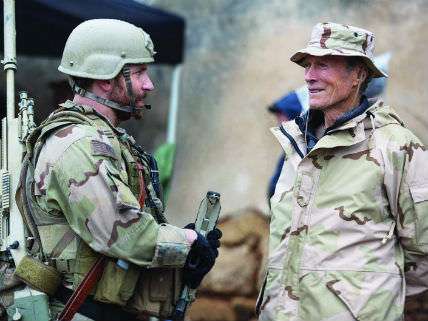Feeling Clint Eastwood's Disgust
American Sniper is not a pro-war movie.

Whatever Clint Eastwood's exact politics may be—kind of libertarian? sort of conservative?—his hit movie, American Sniper, waves no flags for America's involvement in the Iraq war. In a film inspired by the true story of Navy SEAL Chris Kyle, said to be the deadliest sniper in U.S. military history, Eastwood marshals deep feelings about the moral and physical destruction of war, and he flashes anger toward the higher-ups who guide young warriors to their doom. He doesn't flinch from showing us the full ugliness of combat—American forces violently invading an Iraqi home, a vicious jihadi taking a power drill to a helpless civilian—but this is in no way an old-school Hollywood war movie. Eastwood never exults in the brutal action, and throughout the film we can feel his disgust.
Over the course of four tours in Iraq, Kyle was credited with 160 confirmed enemy kills, and he was probably responsible for many more that were undocumented. The man had a terrible gift. Bradley Cooper, who acquired the film rights to Kyle's bestselling 2012 memoir early on, plays him here, bearded and bulked-up, in a performance of intense focus. Cooper has come a very long way from his breakthrough in Wedding Crashers 10 years ago. Here he portrays a difficult character, a man whose emotions are held tightly inside, by subtly projecting those feelings without parading them before us. This is a wonder to watch throughout.
We're introduced to Kyle on a rooftop in Fallujah, sighting his rifle on the street below, alert for targets. He sees an Iraqi woman stepping into the street with a boy who could be her son. She hands the boy a weapon she has brought out from beneath her chador as they both watch an American convoy that's making its way toward them through the rubble of the city. Kyle's duty is alarmingly clear, but his soul is torn.
To illustrate Kyle's divided nature, Eastwood fills in his backstory with compelling economy, flashing back to his Texas childhood. We see him out hunting with his father, dropping a deer with a difficult shot. We see the whole family in church, and later, at the family dinner table, we hear his father explaining his stern view of the world. There are three kinds of people, he says: sheep, who "don't believe evil exists"; wolves, the evil men who prey upon them; and sheepdogs, men with "the gift of aggression," a "rare breed that lives to confront the wolf." Kyle knows which sort of man his father wants him to be.
Appalled by the 1998 Al Qaeda attacks on U.S. embassies in Nairobi and Dar es Salaam, Kyle enlists in the Navy and trains to join the SEALs, the service's elite sea-air-and-land division. In a bar one night, talking to the woman who will soon become his wife, he tells her, "I'd lay down my life for my country. It's the greatest country on earth."
When Kyle deploys to Iraq for the first time, Eastwood shows us how he reconciles his deepest beliefs—his religious faith, his patriotism, his family values—with his duties as, essentially, a professional killer. He appears to have no interest in the political forces in which he's caught up, and this enables him to tightly narrow his focus. He wants only to protect his fellow fighters and to dispatch the evil enemies who seek to annihilate them. Nothing else matters. But his determination to maintain this difficult mental balance begins eating him up inside.
The movie is masterfully shot and edited. It's also unexpectedly intimate, especially in the scenes with Cooper and Sienna Miller, who have a rich chemistry. Miller plays Kyle's wife as a high-spirited woman who loves her husband and the kids they've begun accruing but is distraught as she watches him turning into a stranger, spooked and uncomfortable at home and repeatedly drawn back to the never-ending war. "You did your part," she tells him. "Let somebody else go….If you think this war isn't changing you, you're wrong." But Kyle keeps returning to Iraq, where he does legendary things (taking out one jihadi killer from more than a mile away) and awful things as well. He also has to listen to fatuous officers make statements like, "These wars are won and lost in the minds of our enemies," a line at which we can almost see Eastwood cringing in revulsion.
There surely was more to the real Chris Kyle than what we see here. (He was shot to death two years ago, ironically by a troubled veteran he'd been trying to help.) But Eastwood uses the key aspects of Kyle's life with determined purpose. He doesn't seek to arouse us with the slaughter amid which the celebrated sniper spent so many of his days—the massacred civilians, the dying SEALs choking on their own blood—but to make us think about it. It's not a pretty picture, but Eastwood has made a powerful film out of it.
